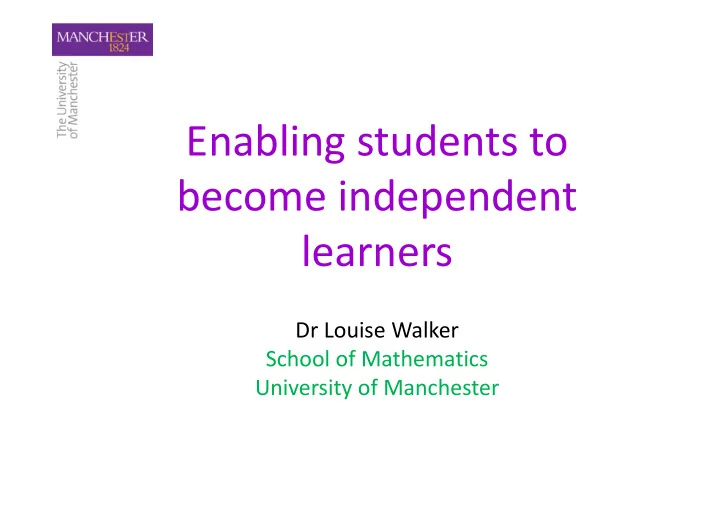

Enabling students to become independent learners Dr Louise Walker School of Mathematics University of Manchester
Transition from school to university Intensively Independent supported learning learning Success at university may depend on a lot more than prior knowledge.
Area Success characteristics Indicators a student may struggle Educational • Shows genuine interest in their course • Shows no interest in their course expectations • Has realistic expectations of university • Makes negative comments about teaching and the workload styles or workload • Is responsible for their own learning Motivation • Is self-disciplined with good study habits • Doesn't attend class regularly • Attends class regularly • Doesn't finish and hand in assessments on • Prepares for lectures and tutorials by time doing preliminary readings and • Doesn't attend exams assessments • Works too many hours which interrupts • Finishes assignments on time and keeps study time (more than 15 hours per week up to date with reading and revision for full time student) • Uses campus services such as the library, • Unwilling to seek help or advice or use learning skills, seminars, IT resources, etc campus services, library, etc Involvement • Understands that uni is about • Lacks friends at uni and doesn't socialise developing personally and socially as well • Socialises too much as academically • Fails to re-enrol • Gets involved in campus-based activities, clubs and societies Wellbeing • Has healthy eating, sleeping and exercise • Has excessive weight gain or loss habits • Has poor sleep habits • Maintains an even keel emotionally • Is always tired • Is aware of and willing to use support • Appears overly anxious or down services if needed eg. financial assistance, • Is self critical or has low self esteem health service, counselling, etc • Is reluctant to use university support • Continues to be involved in family services activities • Avoids family activities and responsibilities www.monash.edu.au
Independent learning is NOT about leaving them alone to get on with it! Independent learning can involve peer-assisted learning, facilitated learning and use of technology.
“ Independent study is a process, a method and a philosophy of education: in which a student acquires knowledge by his or her own efforts and develops the ability for inquiry and critical evaluation; it includes freedom of choice in determining those objectives, within the limits of a given project or program and with the aid of a faculty advisor; it requires freedom of process to carry out the objectives; it places increased educational responsibility on the student for the achieving of objectives and for the value of goals.” Candy P. (1991) ‘Self-direction for lifelong learning,: a comprehensive guide to theory and practice.’
‘Most students entering higher education no longer understand that mathematics is a precise discipline in which exact, reliable calculation, logical exposition and proof play essential roles’ LMS report ‘Tackling the Mathematics problem’ (1995) ‘successful students placed more importance than failing students on … understanding rather than rote learning, and the ability to work independently.’ Anthony (2010) ‘Factors influencing students’ success in mathematics’ Walkden and Scott found that mathematics undergraduate students: ‘expect to assimilate new ideas without mental effort; are reluctant to devote time to study and practice; and lack the necessary persistence to tackle exercises of a non-trivial nature.’ Walkden and Scott (1980) ‘Aspects of mathematical education’
Factors that affect the ability of students to become independent learners • Motivation • Autonomy • Collaboration
Motivation Psychologists define two main types of motivation: Intrinsic Extrinsic Learners are goal Learners engage more driven and study deeply with their strategically with learning and have a minimum effort to desire to fully achieve desired understand new ideas. grades.
Self-efficacy and motivation Self-efficacy is the belief in ones ability to be successful. ‘self-efficacy has emerged as a highly effective predictor of students’ motivation and learning’. Zimmerman (2000) ‘Self-Efficacy: An Essential Motive to Learn’ This can be a problem when students have different educational backgrounds. On university maths programmes where some but not all students had studied further maths, those students without further maths felt disadvantaged. Hoyles et al (2000) ‘Changing patterns of transition from school to university mathematics’
Autonomy Autonomous learners have control over what, when and how they learn. Information and advice on options. Online resources, lecture capture, blended learning, mathematical support centres. Teaching that caters for a range of learning styles. (In a 2011 meta-analysis, psychologists Ronald Fischer, and Diana Boer found that autonomy is a better predictor of happiness than money – The Guardian)
Collaboration Independent learners make effective use of peer learning as well as support from academics. The advantages of peer learning and support are well documented (Topping, Hill, Glynn). Students learn how to learn from other students. When lower year students work with higher year students their confidence and self-efficacy increase. TransMaths Research Briefing (2011) ‘Learning to learn in transition to university mathematics.’
Facilitated Learning Experts guide rather than teach students: • Problem based learning • Enquiry based learning • Project work • Maths support centres Facilitated learning enables students to take ownership of their learning and engage more deeply with the material. Brockbank and McGill (1998) ‘Facilitating reflective learning in higher education’. Postgraduate demonstrators can make excellent facilitators.
Case studies: � Peer assisted study and peer mentoring � Maths Learning Support Centres � Computer Aided Assessment � Mathematical Modelling and Problem Solving
What we can do • Develop opportunities for peer support and learning • Introduce more facilitated learning • Extend access to resources • Don’t overload the curriculum • Increase intrinsic motivation • Listen to students
Recommend
More recommend